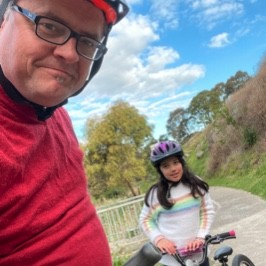The invisible impact of stroke
By Stuart
I was 39 when I had my stroke, just a few weeks shy of my 40th birthday.
I was working on a TV news broadcast when I heard a loud ringing in my ears. Given that I’d listened to punk music for most of my life, this was something that I had experienced before, so I didn’t think much of it.
However, once I left the studio, I felt quite dizzy and lost all feeling in one side of my face. I went into the toilets and noticed the left side of my face had drooped. I tried to talk as I looked in the mirror, but I was unable to speak and could only manage muffled sounds.
I went back out into the newsroom and gestured to my workmates that I was having an issue. Fortunately, they acted quickly, called an ambulance and within half an hour, I was in hospital.
From there, an MRI scan confirmed that I had had an ischaemic stroke, and I was admitted to the stroke unit. I was in complete shock, as I was much younger than the other patients on the ward. Prior to my stroke, I was also quite fit, having run a half marathon only months before.
In the following weeks, I was fully recovered physically. I felt happy that I did not have any physical challenges due to the stroke. However, this led to its own set of problems.
It seemed people expected me to be in a poor state of health afterwards, perhaps with a walking stick or other disabilities commonly associated with stroke. But I had none of these and there was really nothing to suggest the stroke had even occurred.
I felt confused and frustrated.
On one hand, I had stroke specialists telling me that I had been in a life and death situation. I was buoyed by the kind words and support I received, even from people I had not been in contact with for years.
On the other hand, I felt other people dismissed what had happened to me. They didn’t seem to understand that every stroke is different, and that the impact of stroke differs from people to people. I felt like I needed to apologise for not seeming to be in worse physical shape – it’s tricky when the impacts of stroke are invisible.
It reached a point where I started to doubt if I’d even had a stroke. I decided to not discuss what happened with anyone other than those closest to me. If anyone asked me about it, I would quickly shut the conversation down or change the subject. To be told I was lucky was confusing. Lucky is when you win the lottery, not having a stroke. Yet I also understood that compared to many who experienced stroke, I had been very fortunate.
Then I did probably the stupidest thing I could have done. Instead of easing myself back into life, I took on a huge workload. At times, I was working up to eighteen hours a day, both as an employee in a stressful live television job and as a freelance video producer. Additionally, I had a two-year-old daughter at home.
As a result, I became stressed and burnt out. I decided to seek help and was assisted by a wonderful neurologist. When I told him of how I’d thrown myself into work he said to me, “There’s a reason you did this. You’re trying to affirm that you’re still alive.”
He told me I was experiencing hypervigilance anxiety, and said it was common after something like a stroke, particularly among younger people who tend to associate serious medical problems with the elderly.
I felt a weight lift from my shoulders as I left his office. I felt heard and understood.
It’s been over five years since I had the stroke and these days, I’m in a pretty good place. I’m blessed to have had the support of family and friends. I don’t dwell a lot on what happened back then, and for the most part, I have carried on with life as before. Despite the conflicting comments I received in the weeks after my stroke, I do agree that it could have been far more serious.
I’ve participated in Stride4Stroke and will continue to do so in memory of those who didn’t make it or had their lives changed forever. I hope that my story may help those who’ve had a similar experience to me. I don’t want other survivors in a similar position to feel like their experiences have been discounted.
My main advice for other survivors is to keep those that matter close to you. Don’t push them away. And take the time to breathe.
Unless you’ve experienced a stroke, nobody understands the effects that stroke can have, especially when the impact is invisible. Connecting with peers is so important, whether it be through stroke support groups or online through the EnableMe community.

